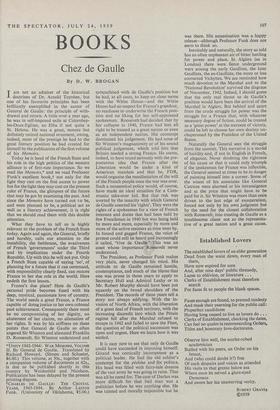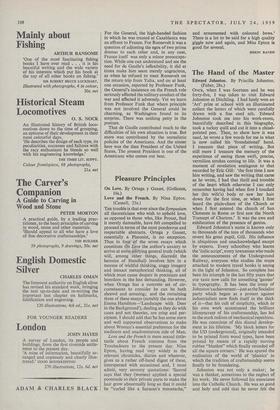BOOKS
Chez de Gaulle
By D. W. BROGAN T am not an admirer of the historical I doctrines of Dr. Arnold Toynbee, but one of his favourite principles has been brilliantly exemplified in the career of General de Gaulle: the principle of with- drawal and return. A little over a year ago, he was in self-imposed exile at Colombey- les-Deux-Eglises, an Elba if not quite a St. Helena. He was a great, remote but definitely retired national ornament, owing, indeed, most of the prestige he had to the great literary position he had created for himself by the publication of the first volume of his Memoirs.
Today he is head of the French State and his role in the high politics of the western alliance is of first-rate importance. So we read the Memoirs,* and we read Professor Funk's excellent book,t not only for the light they cast on the first ascent to power but for the light they may cast on the present ruler of France, the glimpses of the future that may be got by examining the past. And since the Memoirs have turned out to be, and were planned to be, a political act as well as a literary achievement, it is right that we should read them with this double attention.
What they have to tell us is highly relevant to the problem of the French State today. Again and again, the General, briefly and harshly, calls our attention to the instability, the feebleness, the evasiveness of French 'governments' under the Third and by implication under the Fourth Republic. Up with this he will not put. Only a French State capable of saying 'no', of planning for a future that it can command, with responsibility clearly fixed, can restore France to her due role in the world. Here endeth the first lesson.
France's due place? Here de Gaulle's personal pride becomes fused with his deep, mystical, passionate love of country. The world needs a great France, a France capable of doing justice to her own colossal past achievement. Consequently there must be no compromising of her dignity, no abatement of her claims, no alienation of her rights. It was by his stiffness on these points that General de Gaulle so often angered Sir Winston and alienated Franklin D. Roosevelt. Sir Winston understood and
*UNITY 1942-1944: WAR MEMOIRS, VOLUME II. By General de Gaulle. Translated by Richard Howard. (Simon and Schuster, 86.00.) This volume, at 30s., together with a companion volume of documents at 42s., is due to be published shortly in this country by Weidenfeld and Nicolson. Publication has been delayed by the present printing dispute. 'CHARLES DE GAULLE: THE CRUCIAL YEARS, 1943-1944. By Arthur Layton Funk. (University of Oklahoma, 85.00.)
sympathised with de Gaulle's position but he had, at all costs, to keep on close terms with the White House—and the White House had no respect for France's grandeur, no readiness to underwrite the French posi- tion and no liking for her self-appointed spokesman. Roosevelt had decided that by her collapse in 1940, France had lost all right to be treated as a great nation or even as an independent nation. His contempt dominated his judgement. He had none of Sir Winston's magnanimity or of his sound political judgement, which told him that Britain needed a strong France. He seems, indeed, to have toyed seriously with the pre- posterous idea that France after the Liberation would be under a kind of American mandate and that he, FDR, would organise the manifestation of the will of the French people once the war was over. Such a nonsensical policy would, of course, have made an ideal situation for a Com- munist take-over bid. But that risk was averted by the tenacity with which General de Gaulle asserted his 'rights'. They were the rights of a spokesman for a view of French interests and duties that had been held by few Frenchman in 1940 but was being held by more and more, especially by more and more of the active resisters as time went by. In bound and gagged France, the voice of protest could still be heard and increasingly it called, Wive de Gaulle.' This was an asset whose importance Roosevelt never understood.
The President, as Professor Funk makes very plain, never changed his mind. His attitude to de Gaulle remained hostile, contemptuous, and much of the blame that one was prone in those years to apply to Secretary Hull and Admiral Leahy or to Mr. Robert Murphy should have been put squarely on the broad shoulders of the President. The records of these years tell a story not always edifying. With the in- vasion of North Africa, with the liberation of a great deal of French territory, with the increasing discredit into which the Main regime fell after the Marshal refused to escape in 1942 and failed to save the Fleet, the question of the political succession was open and urgent. Here we learn how it was settled.
It is easy now to see that only de Gaulle could have succeeded in imposing himself. Giraud was comically incompetent as a political leader. He had the old soldier's contempt for the peekins and for politics. His head was filled with fairy-tale dreams of the vast army he was going to raise. That was all he cared for. The case of Darlan was more difficult for that bad man was a politician before he was anything else. He was tainted and morally impossible but he
was there. His assassination was a happy release—although Professor Funk does not seem to think so.
Inevitably and naturally, the story as told has an often unpleasant air of bitter battling for power and place. In Algiers (as in London) there were fierce underground wars among the early Gaullists, the later Ciaullists, the ex-Gaullists, the more or less converted Vichyites. We are reminded how much devotion to the Marshal and to the 'National Revolution' survived the disgrace of November, 1942. Indeed, I should guess that the only real threat to de Gaulle's position would have been the arrival of the Marshal in Algiers. But behind and apart from the crude struggle for power was the struggle for a France that, with whatever necessary degree of fiction, could be treated as a 'great power' at the moment of victory, could be left to choose her own destiny un- chaperoned by the President of the United States.
Naturally the General sees the struggle from the summit. This narrative is a model of lucidity and, if not in English in French, of elegance. Never doubting the rightness of his cause or that it could only triumph if the spokesman for France was inflexible, the General seemed at times to be in danger of painting himself into a corner. Some of the wisest of his associates like General Catroux were alarmed at his intransigence and at the price that might have to be paid for it. Sir Winston was more than once driven to the last edge of exasperation, forced not only by his own judgment but by the need for the closest collaboration with Roosevelt, into treating de Gaulle as a troublesome client not as the representa- tive of a great nation and a great cause. For the General, the high-handed fashion in which he was treated at Casablanca was an affront to France. For Roosevelt it was a question of adjusting the egos of two prima donnas to each other and, in any case, France itself was only a minor preoccupa- tion. While one can understand and see the need for de Gaulle's inflexibility, it did at times make him seem merely ungracious, as when he refused to meet Roosevelt on the return trip from Yalta, and on at least one occasion, reported by Professor Funk, the General's insistence on the French role seriously affected the military conduct of the war and affected it adversely. Yet we learn from Professor Funk that where principle was not involved the General could be charming, as Washington found to its surprise. There was nothing petty in the posture.
That de Gaulle contributed much to the difficulties of his own situation is true. But more was contributed by the unrealistic policies of the Americans. And the sinner here was the then President of the United States. The present President is one of the Americans who comes out best.







































 Previous page
Previous page